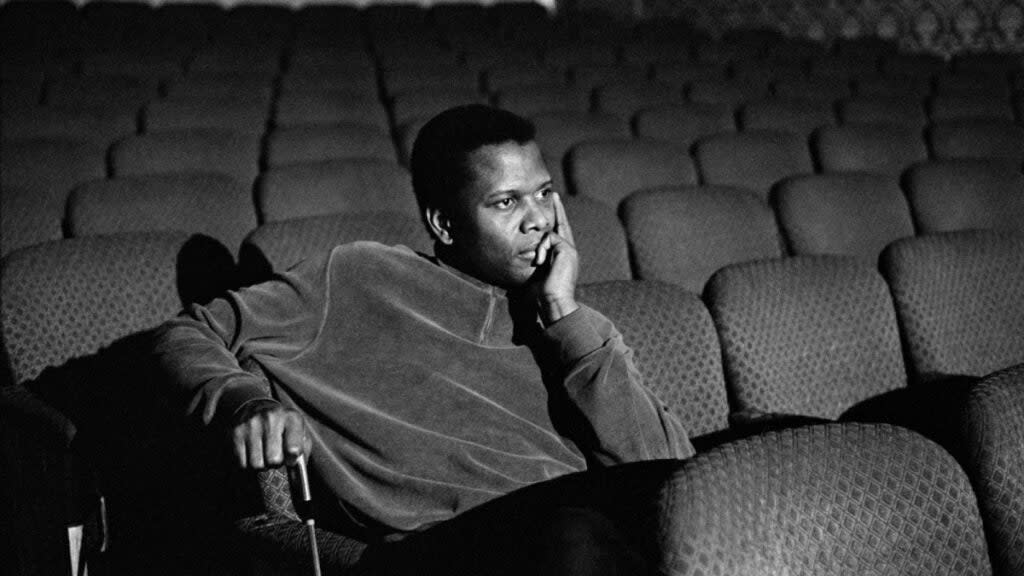‘Sidney’ Review: Oprah-Produced Poitier Doc Doesn’t Dig Deeply Enough

- Oops!Something went wrong.Please try again later.
- Oops!Something went wrong.Please try again later.
- Oops!Something went wrong.Please try again later.
“Sidney,” a documentary tribute to the trailblazing Black movie star Sidney Poitier, was produced by Oprah Winfrey, and it leans far more toward one-dimensional inspiration than insight. Important questions are sometimes raised here by the interview subjects, but they are almost always evasively dropped.
In the opening moments of the movie, we hear Poitier’s unmistakable voice on the soundtrack: “I was not expected to live,” he says. “I was born two months premature.” Poitier relates that his father got a shoebox in which he was going to “tuck me away,” but Poitier’s mother insisted on giving him some more time to recover.
The early sections of “Sidney” are much stronger than what comes later, because it is Poitier himself telling the tale in interview footage and setting the expansive, very dramatic tone. He knew how to tell a story so that each nuance would make itself felt; when he talks about being threatened by sadistic white cops after a move to Miami, and how they told him they would shoot him if he turned around during a 50-block walk, Poitier makes his own trauma felt in the slightly removed way of an older artist.
Poitier had been raised in the Bahamas, and his parents were tomato farmers, and so he had no prior experience of racism when he landed in Miami. He relates a key moment in his life when he was delivering a package to a white household and the woman who answered the door angrily told him to go around the back way; he had never been treated like this before, and when he recognized it for what it was, Poitier put the package down on the front steps. He did not go around to the back door. This is a gesture that, in Poitier’s telling, has the power of legend.
His rebellion against racism got him in trouble in Miami, and so he headed for New York, where he went up to Harlem immediately on arriving. Answering an ad from a theater company that was looking for actors, Poitier was rejected because of his accent, and he determined to rid himself of it, which he achieved partly by listening to a radio announcer named Norman Brokenshire, who spoke in rounded, near-florid tones. Poitier washed dishes for a living during this period, and he married a woman named Juanita, who began having children with him.
Also Read:
Oscars ‘In Memoriam’ Segment Celebrates Sidney Poitier, Sparks Bob Saget Outrage
“Sidney” quickly deals with the insulting roles that Black actors were given in the 1930s and 1940s before Poitier changed everything with his lead performance in Joseph L. Mankiewicz’s “No Way Out.” Poitier’s burgeoning career was briefly but seriously threatened by the Communist witch-hunt, which marked both Poitier and Ruby Dee as radicals. Known for his support of Paul Robeson, his great forerunner in movies and in public life, Poitier was asked to sign a loyalty oath in order to appear in “Blackboard Jungle.” He refused, which took courage, and the matter was dropped.
But you won’t find that out from watching “Sidney.” This key moment in his career is brought up but then so glossed over that we never find out what actually happened. Similarly overlooked is his difficult personal life, which became very messy when he fell in love with Diahann Carroll on the set of “Paris Blues.” In an interview with his first wife Juanita, she speaks of this matter in a detached way, as if she has cauterized the pain of it. Carroll herself is more forthright in brief footage from a talk-show appearance where it is clear that her affair with Poitier left wounds that had not healed.
Also Read:
Sidney Poitier Appreciation: Trailblazer, Icon, But Above All, Artist
The majority of “Sidney” is made up of comments from celebrated colleagues, and some of these can be superficial in the extreme. The limits of this documentary can be felt when James Baldwin’s objection to the ending of “The Defiant Ones,” where Poitier decides to save a white man (Tony Curtis) he has grown to care for, is swept aside so that it can be fully endorsed by Winfrey, who makes the whole ending of this movie about her own feelings about Poitier.
The full story of Poitier’s life and career raises many questions and complications, and it has yet to be told.
“Sidney” premieres Friday, Sept. 23, on Apple TV+.

